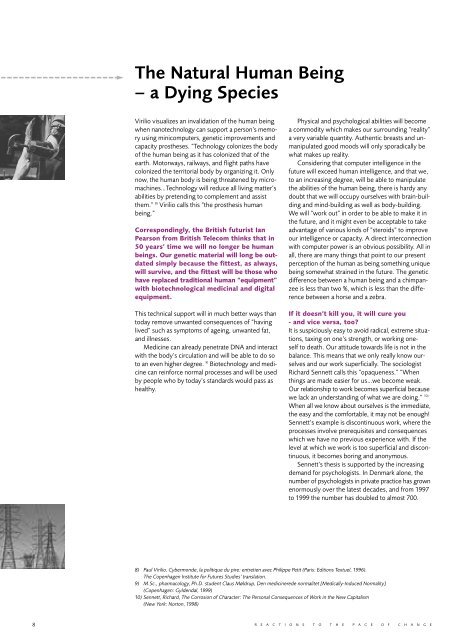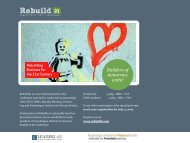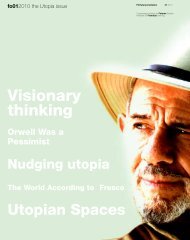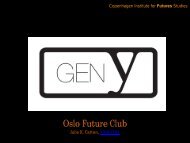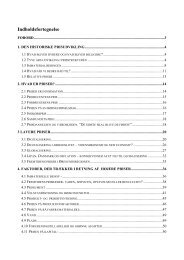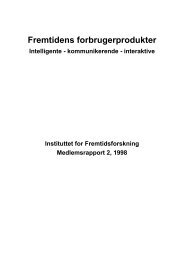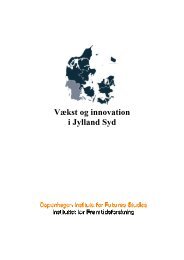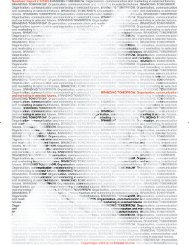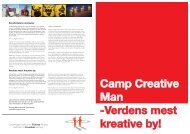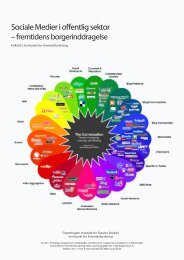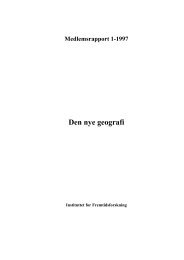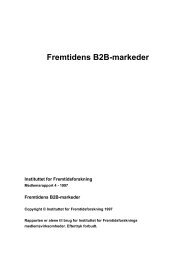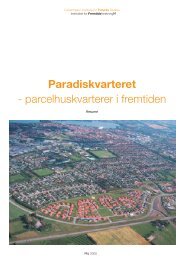The Natural Human Being– a Dying SpeciesVirilio visualizes an invalidation <strong>of</strong> <strong>the</strong> human beingwhen nanotechnology can support a person’s memoryusing minicomputers, genetic improvements andcapacity pros<strong>the</strong>ses. “Technology colonizes <strong>the</strong> body<strong>of</strong> <strong>the</strong> human being as it has colonized that <strong>of</strong> <strong>the</strong>earth. Mo<strong>to</strong>rways, railways, and flight paths havecolonized <strong>the</strong> terri<strong>to</strong>rial body by organizing it. Onlynow, <strong>the</strong> human body is being threatened by micromachines…Technologywill reduce all living matter’sabilities by pretending <strong>to</strong> complement and assist<strong>the</strong>m.” 8) Virilio calls this “<strong>the</strong> pros<strong>the</strong>sis humanbeing.”Correspondingly, <strong>the</strong> British futurist IanPearson from British Telecom thinks that in50 years’ time we will no longer be humanbeings. Our genetic material will long be outdatedsimply because <strong>the</strong> fittest, as always,will survive, and <strong>the</strong> fittest will be those whohave replaced traditional human “equipment”with biotechnological medicinal and digitalequipment.This technical support will in much better ways than<strong>to</strong>day remove unwanted consequences <strong>of</strong> “havinglived” such as symp<strong>to</strong>ms <strong>of</strong> ageing, unwanted fat,and illnesses.Medicine can already penetrate DNA and interactwith <strong>the</strong> body’s circulation and will be able <strong>to</strong> do so<strong>to</strong> an even higher degree. 9) Biotechnology and medicinecan reinforce normal processes and will be usedby people who by <strong>to</strong>day’s standards would pass ashealthy.Physical and psychological abilities will becomea commodity which makes our surrounding “reality”a very variable quantity. Au<strong>the</strong>ntic breasts and unmanipulatedgood moods will only sporadically bewhat makes up reality.Considering that computer intelligence in <strong>the</strong>future will exceed human intelligence, and that we,<strong>to</strong> an increasing degree, will be able <strong>to</strong> manipulate<strong>the</strong> abilities <strong>of</strong> <strong>the</strong> human being, <strong>the</strong>re is hardy anydoubt that we will occupy ourselves with brain-buildingand mind-building as well as body-building.We will “work out” in order <strong>to</strong> be able <strong>to</strong> make it in<strong>the</strong> future, and it might even be acceptable <strong>to</strong> takeadvantage <strong>of</strong> various kinds <strong>of</strong> “steroids” <strong>to</strong> improveour intelligence or capacity. A direct interconnectionwith computer power is an obvious possibility. All inall, <strong>the</strong>re are many things that point <strong>to</strong> our presentperception <strong>of</strong> <strong>the</strong> human as being something uniquebeing somewhat strained in <strong>the</strong> future. The geneticdifference between a human being and a chimpanzeeis less than two %, which is less than <strong>the</strong> differencebetween a horse and a zebra.If it doesn’t kill you, it will cure you- and vice versa, <strong>to</strong>o?It is suspiciously easy <strong>to</strong> avoid radical, extreme situations,taxing on one’s strength, or working oneself<strong>to</strong> death. Our attitude <strong>to</strong>wards life is not in <strong>the</strong>balance. This means that we only really know ourselvesand our work superficially. The sociologistRichard Sennett calls this “opaqueness.” “Whenthings are made easier for us…we become weak.Our relationship <strong>to</strong> work becomes superficial becausewe lack an understanding <strong>of</strong> what we are doing.” 10)When all we know about ourselves is <strong>the</strong> immediate,<strong>the</strong> easy and <strong>the</strong> comfortable, it may not be enough!Sennett’s example is discontinuous work, where <strong>the</strong>processes involve prerequisites and consequenceswhich we have no previous experience with. If <strong>the</strong>level at which we work is <strong>to</strong>o superficial and discontinuous,it becomes boring and anonymous.Sennett’s <strong>the</strong>sis is supported by <strong>the</strong> increasingdemand for psychologists. In Denmark alone, <strong>the</strong>number <strong>of</strong> psychologists in private practice has grownenormously over <strong>the</strong> latest decades, and from 1997<strong>to</strong> 1999 <strong>the</strong> number has doubled <strong>to</strong> almost 700.8) Paul Virilio, Cybermonde, la politique du pire: entretien avec Philippe Petit (Paris: Editions Textuel, 1996).The Copenhagen Institute for Futures Studies’ translation.9) M.Sc., pharmacology, Ph.D. student Claus Møldrup, Den medicinerede normalitet [Medically-Induced Normality](Copenhagen: Gyldendal, 1999)10) Sennett, Richard, The Corrosion <strong>of</strong> Character: The Personal Consequences <strong>of</strong> Work in <strong>the</strong> New Capitalism(New York: Nor<strong>to</strong>n, 1998)8 R E A C T I O N S T O T H E P A C E O F C H A N G E
Seeing <strong>the</strong> foundationNobel Prize winner Sir Harald Kro<strong>to</strong>, who is a travellinglecturer on <strong>the</strong> crisis <strong>of</strong> science, complains thatwe no longer find <strong>the</strong> world interesting. We no longerspend time trying <strong>to</strong> grasp <strong>the</strong> wonders <strong>of</strong> technology.As <strong>the</strong> foundation <strong>of</strong> an ordinary weekday,we depend on many technological developments,<strong>the</strong> elements and functions <strong>of</strong> which we do not know,such as phones, artificial fibres <strong>of</strong> raincoats, and <strong>the</strong>mechanics <strong>of</strong> <strong>the</strong> ball-point pen. Life has becomeso comfortable that we find it dull! In his opinion,schoolchildren should be forced <strong>to</strong> live one week,or a single day, in <strong>the</strong> 12th century, or in <strong>the</strong> 19thcentury, in order <strong>to</strong> realize what technology hasachieved. “Understanding scientific language is likereading one <strong>of</strong> <strong>the</strong> world’s great authors,” statesKro<strong>to</strong>.The fight for attentionThe price <strong>of</strong> digital cameras, and digital technologyas such, will drop so low that in <strong>the</strong> future it will bevery easy for amateurs, con artists and unwantedsalespersons <strong>to</strong> produce virtual or filmic productswhich resemble genuine products. President <strong>of</strong> CBSRobert Wussler estimated that in 10 years’ time <strong>the</strong>remight be millions <strong>of</strong> film producers and channels.Every day will be a constant fight for everybody’sattention, and it is possible that this will result in adisgust with <strong>the</strong> media. Some <strong>of</strong> <strong>the</strong> weapons willbe interactive TV shows. Watching TV all day longis boring – because it is one-way communication.Those who are children <strong>to</strong>day will want <strong>to</strong> create TVand be creative on <strong>the</strong> computer. Passive feeding willcreate disgust. Viewers will want <strong>to</strong> be co-crea<strong>to</strong>rsand ac<strong>to</strong>rs. And soon this will be possible. Wusslerimagines <strong>the</strong> number <strong>of</strong> TV channels <strong>to</strong> be closer <strong>to</strong>five million than 500 in 10 years from now.Lecturer in Psychology at Aarhus University,Thomas Nielsen, links <strong>the</strong> phenomenon <strong>of</strong> growingdemand for active participation <strong>to</strong> <strong>the</strong> need <strong>of</strong> individualattention. “The TV media is <strong>the</strong> candy-floss <strong>of</strong>fame. It is <strong>the</strong> easy road <strong>to</strong> fame because seeminglyyou do not have <strong>to</strong> work very hard. You can becomea TV host…present <strong>to</strong>morrow’s wea<strong>the</strong>r… Participationin <strong>the</strong> Robinson expedition [Danish TV show]and o<strong>the</strong>r island shows might be looked at as <strong>the</strong>bot<strong>to</strong>m line <strong>of</strong> fame. Here it is possible <strong>to</strong> becomefamous just sitting around picking your <strong>to</strong>es andgoing hungry for a day or two on a deserted island”…“nobody can s<strong>to</strong>p us from thinking that we are eachand every one <strong>of</strong> us great people who deserve <strong>to</strong>be famous and looked up <strong>to</strong> by o<strong>the</strong>rs. We becomemore and more self-centred because nobody isholding us back.” 11)Au<strong>the</strong>nticity as a <strong>to</strong>urist attraction“Tourism” in anti-modernity:Urbanization, <strong>the</strong> accelerating pace <strong>of</strong> change, andindividual freedom have caused a continued growthin <strong>the</strong> entertainment value <strong>of</strong>, and <strong>the</strong> romanticismsurrounding, <strong>the</strong> contrasts <strong>to</strong> modern benefits:Romanticism surrounds that which is au<strong>the</strong>ntic,original, un<strong>to</strong>uched and old. That which cannot bereproduced.Nei<strong>the</strong>r <strong>the</strong> Greeks nor <strong>the</strong> Romans had any idea<strong>of</strong> progress. All progress equalled decline: It beganwith <strong>the</strong> golden age (Paradise) by way <strong>of</strong> Silver andBronze <strong>to</strong> <strong>the</strong> ultimately horrid Iron Age. That view<strong>of</strong> his<strong>to</strong>ry is ubiqui<strong>to</strong>us <strong>to</strong>day. If human beings havea tendency <strong>to</strong> idealize <strong>the</strong> time when <strong>the</strong>y wereyoung and happy, or simply invent <strong>the</strong> present as<strong>the</strong> cause <strong>of</strong> <strong>the</strong>ir disillusionment, <strong>the</strong>re is alwaysgoing <strong>to</strong> be a market for o<strong>the</strong>r times. Maybe inparticular <strong>the</strong> past. (Because we may be absolutelycertain that it is not going <strong>to</strong> come back, and <strong>the</strong>reforeit does not demand that we do anything o<strong>the</strong>rthan dream).Souvenirs and lampshades from a different placeor ano<strong>the</strong>r time may be as ugly as <strong>the</strong>y please, but<strong>the</strong>y remind us <strong>of</strong> experiences we once had.Not only time – place can also signalgood things such as1. A different world with greener grass2. A glimpse <strong>of</strong> <strong>the</strong> unknownApples from a particular region are special because<strong>the</strong>y taste <strong>of</strong> <strong>the</strong>ir origin. The origin <strong>of</strong> place is anidentity fac<strong>to</strong>r which we can sense!Adventure <strong>to</strong>urismThe sociologist Dean MacCannell has claimed that<strong>to</strong>urism is <strong>the</strong> modern human being’s answer <strong>to</strong> pilgrimage.12) Modern human beings transport <strong>the</strong>mselvesaround <strong>the</strong> world seeking au<strong>the</strong>nticity. Beinga <strong>to</strong>urist is partly about seeing something new, partlyabout “uncovering” something different and gettingit. We seek life outside ourselves, among o<strong>the</strong>r reasonsbecause we want <strong>to</strong> expand our frame <strong>of</strong> referenceand our world. Uniformity bores most peopleafter a while, think <strong>of</strong> breaks in school every 45minutes, crises in even <strong>the</strong> best marriages and mostpeople’s need <strong>to</strong> change or upgrade jobs at certainintervals. As a survival strategy, <strong>the</strong> point <strong>of</strong> acquiringas many experiences as possible is that <strong>the</strong>y arm onebetter against future experiences – <strong>the</strong>re is simplya better chance <strong>of</strong> having tried something similarwhen one has “practised.”C O P E N H A G E N I N S T I T U T E F O R F U T U R E S S T U D I E S11) Danish weekly Søndagsavisen, Oc<strong>to</strong>ber 199912) Dean MacCannell, The Tourist: A New Theory <strong>of</strong> <strong>the</strong> Leisure Class (1976; University <strong>of</strong> California Press, 1999)M E M B E R S R E P O R T 1 / 2 0 0 09


